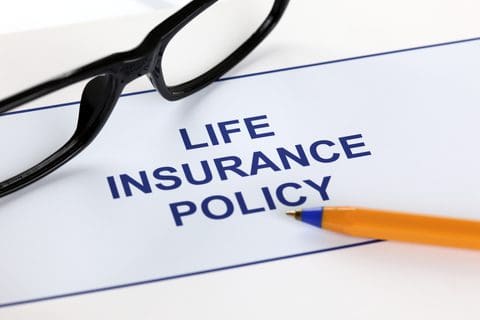Life insurance is often thought of as a safety net. It protects your family and loved ones if you are no longer around to care for them.
You’ve been paying for years into the same company for the same amount of coverage on what seemed like an endless, open-ended policy with no expiration date in sight.
But what happens to term life insurance at the end of the term?
Most people don’t realize that term life insurance expires. If you have an unexpected illness or accident, it may be difficult to find new affordable coverage because of pre-existing conditions.
It’s a scary thought and one that many of us do not think about until it is too late.
If you still need life insurance at the end of your term, several options are still available to protect your family financially.
quick navigation links
 Does Life Insurance Expire?
Does Life Insurance Expire?
Term life insurance is a fantastic way to provide death benefits for your family in the event of your premature passing.
So, does term life insurance expire?
A term length of between 10 and 40 years is set when you initially buy your policy and does not change as long as the premiums are paid.
When your term ends, your coverage does not technically expire, but the premiums will increase each year.
Most people purchase term insurance as a precautionary measure to protect their family and probably never use the death benefit.
It would help if you attempted to coordinate the length of your policy with when you think your anticipated financial obligations will have diminished.
If you are unsure of your future needs, a safe purchase would be a 40-year term life insurance policy.
This policy can be an excellent option for younger buyers who need more extended coverage but don’t want to commit to a lifetime policy.
Can you cash out a term life insurance policy?
Unlike permanent coverage, there is no cash value element with most term life insurance policies.
Term coverage offers premiums, but no cash value or death benefits will be paid out when a term life insurance policy expires.
You could buy a return of premium term rider that allows you to cash out of your policy when it expires.
A return of premium rider is devised to give you a cash refund of all of your premiums if you outlive your policy.
However, with a return of premium term (ROP), your premiums will be much more expensive than a regular term policy.
A term insurance policy provides necessary financial protection and should not be considered an investment.
The lack of a cash value makes it significantly more affordable than universal life or whole-life insurance.
Universal life and whole insurance are considered permanent coverage and provide lifetime coverage.
Since your life insurance builds cash value and will last your entire lifetime, the disadvantage of permanent insurance is higher premium payments than term coverage.
So, does whole life insurance expire?
The primary advantage of permanent coverage is that it does not expire, and you can not outlive a whole life insurance policy.
 Strategies for Extending Term Life Insurance
Strategies for Extending Term Life Insurance
So, can you extend a term life insurance policy?
Good news!
If you find that you still need life insurance, you do have options for extending your coverage.
There are plenty of reasons why you might need coverage after your term life insurance policy terminates.

REASONS FOR Extending term INSURANCE
- Married: Most married couples buy life insurance to cover each other during their careers.
- Children: Life insurance coverage is usually essential for couples with children to protect.
- Mortgage Protection: A term policy can be perfect for people needing to protect a mortgage balance.
- Income Protection: A life insurance policy is an exceptional method for couples to preserve their income for remaining family members.
- Divorce Decree: If you rely on your ex-spouse for monetary support in the future, they must provide a divorce life insurance policy as part of your settlement agreement and list you as a beneficiary.
- Final Expense Coverage: A final expense policy to cover your burial and pay off any outstanding debts is a common reason for extending coverage.
If you add up all of your family’s current debts, living costs, and projected financial obligations, you can see why you may need to extend your term life insurance policy.
 Renewable Term Insurance
Renewable Term Insurance
So, what happens when term life insurance expires?
After the term life insurance maturity date, you can usually extend the policy every year but at a much more expensive cost.
You can extend your coverage under a yearly renewable term policy without undergoing the underwriting process and getting a medical exam again.
However, unlike your previous term, the premiums will increase each year when your term ends.
Please refer to your policies specification page or call your insurance company to obtain the schedule of rate increases with your particular policy.
Please don’t be surprised by the sticker shock you will have on your new premiums.
However, if you need to lengthen your life insurance coverage for a few more years beyond the previously expired term policy, this could be a good option for you.

benefits of renewing a term life policy
- Allows you to keep your coverage at the end of your initial term.
- Allows you to keep the original death benefit of your policy.
- It spares you from answering medical questions or undergoing a medical exam.
- Good option if you only need coverage for a short time because of limited life expectancy.
Of course, this is all subject to your coverage actually being renewable term insurance with your current insurance company.
 Converting Term to Whole Life
Converting Term to Whole Life
Many insurance companies offer a conversion privilege to replace an expiring term life policy with a permanent policy, such as universal or whole life insurance.
Universal or whole life insurance policies benefit some people because they have a cash value and a death benefit.
Permanent life insurance policies are more expensive than term life policies.
To help conserve money on the increased premium, many companies will allow you to convert only a portion of the previous coverage amount.
It would be best if you always examined this decision before your current term policy expires, as there will always be a deadline for the conversion.
Since many companies have an age limit for a life insurance conversion, discuss your options with a life insurance agent.
Common Conversion Rules
Entire Term: This permits you to convert your policy during the policy term.
Period of Time: This enables you to convert your policy for a specific period, commonly in the first five years of the policy term.
Age-Specific: This entitles you to convert your policy up until a specific age, generally until age 70.
Life Insurance Conversion Case Study

At age 55, Jerry was accepted for a $500,000, 20-year term policy for which he pays $1,480 annually.
Five years later, Jerry developed some health issues. During this time, he realized that his 20-year term policy was inadequate long-term protection for his family.
He could not be approved for additional new coverage because of his current health problems.
He remembered that his current policy had a conversion option, which meant he could convert all or a part of his policy without a medical exam.
At age 60, he was still within his policy’s conversion period, so he began investigating the products available by his insurance company.
After considerable thought, he converted the total $500,000 into a universal life policy. The premiums on his new policy were $7,400 per year.
If he had decided to convert only $2500,000 to a universal life policy, the premiums would have only been $3,800 annually.
He would also be able to keep the balance of his term coverage ($250,000) for its entire duration.
 Buying New Life Insurance
Buying New Life Insurance
Converting term life to permanent coverage is more expensive than buying a new term policy.
Sometimes, the least expensive option is to apply for a new term or universal life policy.
Comparing new life insurance prices and arranging the perfect policy often seem tiresome.
Healthy people should always analyze new quotes with the conversion options available with their existing policy.
Many healthy insurance buyers should qualify for a simple no-exam underwriting process, which is becoming more widespread with time-crunched consumers.
However, many life insurance companies expect applicants to do a short insurance physical to qualify for new coverage.
Ultimately, your decision will depend on how much life insurance you need, your unique financial situation, and your specific stage in life.
Suppose your purchase’s initial term policy was shorter, and you still have financial obligations after it expires. In that case, you may consider purchasing another 10-year life insurance policy.
Term coverage is a good fit for many people with various needs, including when your children are young and in their peak earning years.
A life insurance ladder may make sense if you have various needs and do not want to commit to a longer-term length policy.
With a life insurance laddering strategy, you could save money by having two separate term insurance policies staggered in length to match specific protection needs.
You can buy term insurance instead of a permanent policy and invest the money saved for better returns, or spend the funds yourself!
In other circumstances, policies that last your entire life may be a better option for coverage, according to an article in Forbes Advisor.
A few everyday situations better suited for longer-lasting permanent life insurance include: providing for special needs children, estate planning, or paying for final expenses.
Healthy people needing lifetime coverage can always purchase guaranteed universal life insurance coverage.
These lifetime plans do not accumulate cash value like term insurance, but the premiums have a guaranteed no-lapse guarantee to maintain lifetime coverage.
Please always ensure you are approved with a new policy before canceling life insurance with your current company.
 Why Choose Affordable Life USA?
Why Choose Affordable Life USA?
We all know that life insurance is integral to securing your family’s future, but finding the right balance between cost and coverage can be challenging.
Before analyzing insurance carriers, choose the type of life insurance you require, such as term or guaranteed universal life insurance.
Then, decide on the proper life insurance death benefit and the term length to fit your needs and budget.
We are an impartial, independent agency and provide life insurance rates from a network of numerous life insurance companies.
Using our calculator, you can compare our life insurance rates without speaking with an agent.
Tending Life Insurance Topics
-
Affordable Life USA offers comprehensive life insurance solutions to families and business owners throughout the United States.
Our founder, Eric Van Haaften, developed his passion for quantitative analysis while earning his business degree from Ferris State University, which laid a strong foundation for his analytical approach to financial planning.
Eric has obtained a professional LUTCF designation, awarded by the National Association of Insurance and Financial Advisors and the American College of Financial Services.
Another professional accolade is qualifying for the prestigious Million Dollar Round Table. Eric also serves as the treasurer of the Senior Sing Along charity.
Eric Van Haaften, LUTCF

-
Affordable Life USA
2524 Woodmeadow Grand Rapids, MI 49546 . 1-877-249-1358
 Does Life Insurance Expire?
Does Life Insurance Expire? Strategies for Extending Term Life Insurance
Strategies for Extending Term Life Insurance Renewable Term Insurance
Renewable Term Insurance Converting Term to Whole Life
Converting Term to Whole Life Buying New Life Insurance
Buying New Life Insurance 


